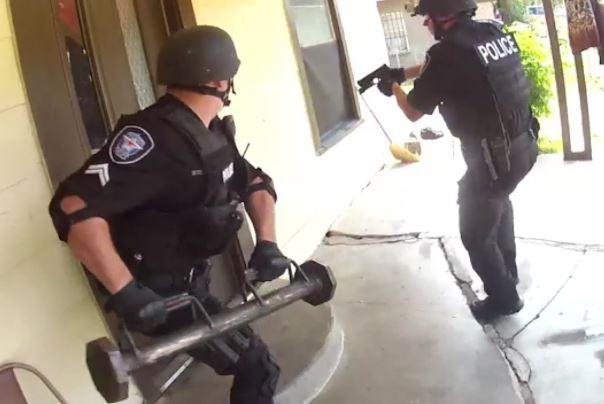The Warrant Requirement
- posted: Apr. 12, 2021
Thinking about search and seizure issues is a daily part of life for most law enforcement officers. Arresting a suspect, looking for evidence, making a traffic stop, and seizing evidence are all activities law enforcement officers engage in on a daily basis and issues of search and seizure are necessarily implicated.
The guiding principles for searches and seizures are contained in the Fourth Amendment to the United States Constitution. This amendment provides:
“The right of the people to be secure in their persons, houses, papers, and effects, against unreasonable searches and seizures, shall not be violated, and no warrants shall issue, but upon probable cause supported by both or affirmation, and particularly describing the place to be searched, and the persons or things to be seized.”
Article 1, Section 15 of the Missouri Constitution has a virtually identical provision and is equally applicable as a guidepost in this area

A law enforcement officer operates under the umbrella of “reasonableness” when dealing with searches and seizures. It has been repeatedly held by the U.S. Supreme Court, as well as the federal and state courts, that a search without a warrant is presumed to be unreasonable and, therefore, invalid under the Fourth Amendment. In that situation, the burden is upon the government to prove adequate justification for the warrantless search. This can only be done if the government proves that the warrantless search falls within one of the few specifically established and well delineated exceptions to the warrant requirement. If the state fails to meet its burden of proof, the evidence obtained pursuant to the unreasonable search will not be admissible into evidence.
Therefore, a law enforcement officer should always apply for and obtain a search warrant if possible. As the U.S. Supreme Court has stated, “the police must, whenever practicable, obtain advanced judicial approval of searches and seizures.” Perry v. Ohio, 932 U.S. 1, 88 S.Ct. 1868, 20 L.Ed. 2nd 889 (1968).
When courts consider the necessity of a search or arrest warrant, generally speaking, they start with three basic questions:
- Does the suspect possess a reasonable expectation of privacy?,
- Is the official action contemplated a “search?”, and
- Is the official action contemplated a “seizure?”
As a general rule, a person has a legitimate expectation of privacy in his person, house, papers, and effects according to the federal and state constitutions. The courts have interpreted those terms to include a person’s house, apartment, office, personal property, brief cases, luggage, other containers, and the person himself. The courts have also held that a person has no legitimate expectation of privacy in abandoned property, open fields, or items or communications which are in plain view or hearing of the general public where the person has made no efforts to protect his or her own privacy. If a person does have a legitimate expectation of privacy and the action contemplated by the law enforcement officer is one that would infringe upon that expectation of privacy, then the contemplated course of action by the law enforcement officer would be a “search.”
A “seizure” can take two forms. There can be a “seizure” of property or a “seizure” of a person. If the action contemplated by the officer would cause a meaningful interference with a person’s possessory interest in an item of property, the action contemplated would be a “seizure” of property. If the action contemplated by the law enforcement officer is the use of actual force to restrain a suspect, the action contemplated would be a “seizure” of the person. A “seizure” of the person can also occur if the law enforcement officer takes actions which would constitute a “show of authority,” thereby causing the person to actually submit to the officer.
The general rule is that the Fourth Amendment of the United States Constitution requires such “searches” or “seizures” to be reasonable. If a “search” is conducted without a warrant, it will be presumed to be unreasonable and the government runs the risk of not being able to use the evidence at trial.
If law enforcement has conducted a search or seizure of your person or property, with or without a warrant, you should contact an attorney to discuss your rights. If you, a family member, or friend has been accused of or charged with a crime in Missouri, our legal team at Parker Law LLC is committed to helping you obtain the most favorable outcome possible. At Parker Law LLC, we believe in pursuing excellence with every client.



